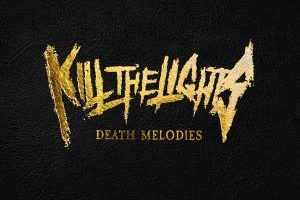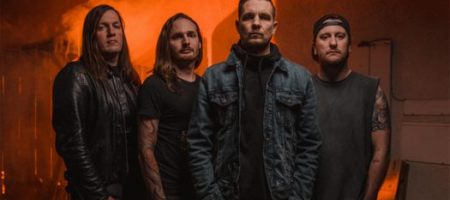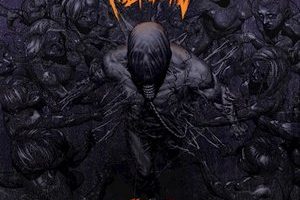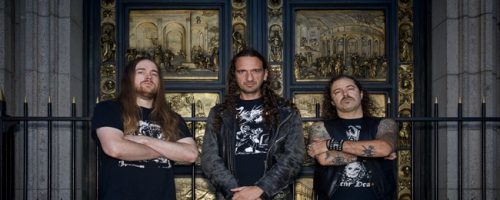Kill the Lights – Melodies of Death
Sunday, 31st March 2024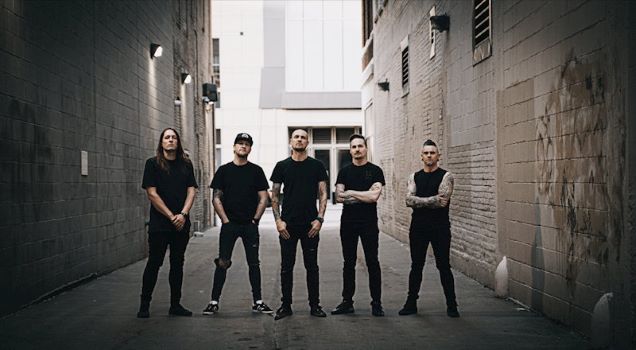
Many bands saddled with the ‘supergroup’ status tend to release an album, see where it takes them, and then tend to vanish. Rare is an act that not only rises further into their own, but continues to raise the bar for themselves. Kill the Lights contain members from very large metalcore founders, but continue to craft a sound that is more their own, and energized by many sounds. We spoke with vocalist James Clark about the band’s step up with new album Death Melodies, the supergroup label, songwriting process, and much more.
Dead Rhetoric: How do you feel Death Melodies compares to The Sinner?
James Clark: I think it’s definitely an evolution of our sound. The first album was really the five of us coming together and learning each other and learning, as with every new band, what your sound is. We kind of pieced it all together and created The Sinner from that. The nice thing about Death Melodies is that we have basically had four or five years together right now and we have worked together, and everyone’s flavor is kind of melded together to create what kind of our sound. Before it was more of a sprinkle of this or that, but I think now we found our rhythm and our space to define who we are as our own band, and not anything that anyone has been into before.
Dead Rhetoric: I know there’s a whole big merger of bands that you can tag along with Kill the Lights due to everyone’s collective experience. Having heard it myself, I think that definitely speaks to the album as well.
Clark: Yeah, obviously with the singles they are reflective about the album. What I love about this album, and I loved about The Sinner too, is that if you listen to the whole album, it’s like a rollercoaster ride. It’s not the same song over and over again. Some of the singles are what you might call ‘radio friendly-ish’ but then we have a few more [heavier]. I was talking to my wife earlier, and all of my favorite songs on the album are not the singles. I think that’s a good problem to have. We landed on about 23-24 songs and we had a few listening sessions of what to put on the album. Everyone had their favorites and it was a real battle to decide what made it. I think it’s a nicely rounded album. I love an album too as a music listener. You can listen to every track and you don’t feel the need to skip, or go from 1 to 7 and pick the three songs that are good on it. That does happen – I’m pretty proud that there is not much filler on the album. It’s good!
Dead Rhetoric: So if you had that many songs and everyone is fighting over them, what is going to happen to the songs that didn’t make the cut?
Clark: I think there is probably going to be a deluxe release. There’s another track or two that we recorded. There were also a few that we didn’t think were quite strong enough for the album, so whether or not something gets reworked or the riffs get reused is a possibility. I think we started out around 50 song ideas that we narrowed down to those album choices. It’s interesting, because we had a few songs that started off kind of different, just with those editing – like take just this one riff and redo the whole thing. We had one or two songs on the album that emerged into a whole new entity using a riff instead of having five on the song. It’s a nice platform to be able to start with some material when writing a new album. We want to get right into it too, we already have like 3-4 new songs. I haven’t put the vocal melodies to them but they are in preparation for the third album.
Dead Rhetoric: Do you feel like the album title kind of describes your sound as a band?
Clark: It started off as a song title, that’s what Death Melodies was. I was chatting with the boys and I thought it would be a really good album title. The vision around the album and title was that it’s a soundtrack to everyone’s life. I don’t care what walk of life you go through, your age, we all go through lows and challenges in life. Personally there are things like anxiety and depression. We go from those high feelings to those lows, and life is that. It’s a walk through death from birth til the end, and it’s a soundtrack going through. So it’s going through this rollercoaster of life and the battles and successes with that from start to finish. That’s the vision of the album.
Dead Rhetoric: With members living in different parts of the world, what’s your songwriting process look like? You mentioned this album was more cohesive than the last one.
Clark: On the first album, it was kind of a mix. Jordan [Whelan] has some initial ideas, then we brought Travis [Montgomery] in, and I demoed the song “The Faceless,” which I believe was our first ever release. What’s been nice on this, the four songs we are working on now, we were together in the studio and wrote them in studio. So whenever we are in the same spot, we try to get a studio for a few days so we can spend time together [to write]. The guys have also flown out to Minneapolis where I am based, and we filmed 5 music videos, and we wrote like 4-5 songs. We did that all in like 7 days. It was crazy! We did some photo shoots too, and some other content, and it was all in like 6-7 days.
So the mix is that, and I think it’s a nice thing where we are at with technology these days, is that sometimes Travis will come up with an idea, then I’ll come up with the vocal melody and lyrics, and then we’ll record and then Jay [James] will put his stuff on it too. It’s a nice way to get things recorded collectively without being together. We can collectively write without being in the same space. Sometimes it’s easier that way too. When you don’t have five people in a room and all trying to get things done. Sometimes less cooks is better. I think we do well with all of it, and then we we get together it all turns out nicely. Jay and Travis flew out to me for a big writing session for Death Melodies. We all had a session together. Jordan and Jay got together, then we got together with them – so it’s a whole mix of everything. But it works well.
Dead Rhetoric: Being in other acts before Kill the Lights, what makes this band rewarding for you?
Clark: It’s just really playing with guys who have been there and done that, but also guys that are super talented and it’s just super fun to play with people who can bring it to the next level. They are great guys who are all on the same page and want to make really great music. It’s a fun environment to be around.
Dead Rhetoric: Songs to Die For Spotify playlist was something I saw on your Facebook page, as well as a fan-based one. What inspired their creation?
Clark: I think it’s just to wrap your arms around the whole concept of the album. To make it it’s own entity. Death is a really sad and hard thing, but it’s also pretty much a guarantee. We are all going to die at some point right? So it’s to create that reflection. What represents you? What songs represent you and your life. I think everyone has a different story and it’s kind of cool. We put a list of things together. It’s kind of cool because we tried to deviate out. I listen to all kinds of music. There’s lyrics and songs that are on that list that really echo and I can relate to. It’s just part of the overall concept and connect with fans to share where we are at and share that vision of the record, but also share what we are feeling and experiencing in our daily lives.
Dead Rhetoric: It was cool that I went through the playlists and there was a good chunk that wasn’t all metal. Which isn’t always the case.
Clark: The cool thing about it is that the guys are pretty diverse in just listening to different things. Just look at Moose. He’s into a lot of the old school punk. I grew up on a lot of old school punk and was in a punk band. So we look at where everyone is coming from. Obviously everyone loves metal and all that, but we have some really cool elements that spread – even into some of the acoustic acts that you probably don’t expect metal dudes to listen to. But I think what inspires me and helps me with writing concepts and ideas is not to just follow the standardized metal stuff. If you look at my playlist, most of it isn’t metal. It’s a crazy mix of everything.
Dead Rhetoric: I wouldn’t classify Kill the Lights as metalcore but it was the closest jumping point I could think of. How do you view the band and genre?
Clark: I guess people are always going to put music into one genre or another. I think metalcore is a great genre. The guys in my band had kind of pinnacle roles in all of it. When we look at this record, and I’d like to think it’s not another metalcore record. I like to think that people can see the dynamics and the mix of songs. Our next single coming out is absolutely not metalcore. It’s got all kind of things. I think we tried not to confine ourselves into what we can’t and can do. If it’s a good song, it’s a good song. People are always going to try to judge bands and will always have an opinion – and want you to write the same song 60x over. That’s fine, but we aren’t going to do that.
I think this is an evolution. I think there are heavier songs on the record. I think there are more mellow songs and more dynamic songs. I think every band is going to say their next one is the best, but I truly believe we have captured something really cool on this. I did some falsetto stuff, and you don’t traditionally see that in metalcore. So we didn’t limit ourselves on this record – otherwise it narrows you down really quickly. Early on, we had some more mellow ones on The Sinner, and I think people respect having that diversity on the record. So we made it clear early on that we were going to cover everything, but tastefully.
Dead Rhetoric: This might actually sound a little silly after all the talk we’ve had, but do you feel there is cross-over appeal with a larger base than just metal for Kill the Lights?
Clark: Absolutely. The first couple things are more radio friendly, and as you listen to the whole album, there’s a mass appeal in terms of the depth the songs all have and the highs/lows in it. I think we are writing for ourselves and no one else, and no one is directing what we write. We stay true to ourselves and there’s no direction from the label or anyone supporting us. That was one of the things that when we got signed, we had great discussions about what we wanted to do, and what we saw and how we had to do it. There’s no decisions on what and how we would write, which is pretty inspiring to do.
Dead Rhetoric: What are your thoughts on the whole ‘supergroup’ label? With all the bands that you all have been in, the quick and easy thing is usually to sell that ‘supergroup’ label around.
Clark: I laugh, because when you list out supergroup, I’m the ‘etc’ guy at the end, so they name everyone else and I’m the guy at the end of the line who is least known. You can call it what you will I think. Oftentimes, supergroups come and go in one album. It’s not a focus, or it’s a side project. Everyone in this band is focused on Kill the Lights. I think that’s great, but there’s some weight that comes with the word supergroup. You have to be good. We have done a good job of backing it up. The other thing is that you have to be careful not to sound like any of your old bands either. That’s not a good look either. With this new album, of course you have two guys from Bullet for My Valentine, and they are involved in the writing. You have Jordan from Still Remains and Travis from Threat Signal. You can hear all those influences, but like we talked about, it’s more melded. It’s its own entity now.
Dead Rhetoric: What is most important about getting a new band off the ground at the start?
Clark: A lot of it is, we talk about grinding and working, but talent is one thing. The second thing is work ethic. It just requires many hundreds and thousands of hours working at your craft together. I have been in three previous bands. I was trying to count the other day, and I’ve written over 200 songs. I feel like I am getting to the stage – it took time. I wasn’t naturally gifted to be this amazing songwriter. It meant taking time and practicing. You have to grind and work hard. Sometimes you have to look at all the bands out there working hard that just don’t get noticed. I think you have to be honest about that too. Not everyone band is big as they should be, there’s a lot of bands that should be bigger. There are stepping stones that come along, and you make a step forward and go two back. There’s so many variables in all of it.
The key is to work with people you enjoy being around. It is hard being in a band. It’s like being married to four or five other guys. It can be a battle sometimes. You take musicians, who are pretty passionate people, and I think what works best for us is that we are all pretty much on the same page. We have all toured and been through things. It’s about getting out there, playing shows and practicing. It’s got to be fun. If you are enjoying it, you can tell.
Dead Rhetoric: Who would be a band that is really talented that isn’t currently getting the attention they deserve, to you at least?
Clark: One band would be Sleep Token. They are on like album three now, but I think I’ve seen those guys in LA with Polyphia going back two or three years now and they were just getting momentum going. It was a bit of a different sound and people weren’t quite plugged into it yet. That’s actually really inspiring, since they are a band that slowly grew instead of just blowing up. Their newest album is great, but it’s been a slow build for them to become so well known. It’s different, it’s cool, and even the way they switch into some jazzy/funky material, it’s cool. That’s a good example of something new. Taking 3-4 genres and then creating a new thing. If we look at bands who have changed the genre or created new ones, there aren’t a ton of bands that have done that.
Dead Rhetoric: What are your plans for 2024?
Clark: We are hitting Europe for a headlining tour in April. We are excited for that. The album comes out in March, so we have some lead before the headline run. We have all of the singles rolling along with videos and press. The main thing is to hit the road hard this year, rolling in with some festivals and shows in the summer. We were unfortunate to get hit with COVID as the first album came out, which was interesting now since this feels like our first release. We are able to go out there and tour. It was difficult to tour during that time and we didn’t want to sit on the record. We are excited to get out there and connect with fans and play a mix of both albums on this tour.
Kill the Lights on Facebook
Kill the Lights official website











